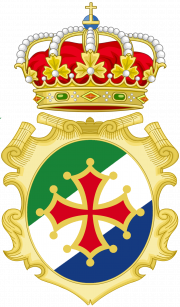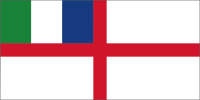Political Reform and Organization of the Rhodesian Confederation
| The Great Rhodesian Political Committee | |
|---|---|
 |
|
| Headquarters | Valhalla of Providence |
| Official Languages | English |
| Established | 6-07-2013 |
The organization and reformation of the political aspects of the Rhodesian Confederation correspond uniquely to this Most Serene Political Committee of Greater Rhodes. This committee is permanently integrated by Their Majesties, the Lords of the House of Lords of West Rhodes and the Rhodesian Confederation, and temporarily by any other natural or legal entities that the Lords consider competent to enact reforms on the Greater Rhodesian political system.
This page ought to be used as a communication mean for major political decisions from the Rhodesian Confederation in general, and the Most Serene Committee in particular. It should also set the Constitutional Principles on which the Rhodesian member states shall be based on in their operations.
Political Aspects
The executive functions of the Rhodesian Confederation lay upon the House of Lords of West Rhodes. The Political Legislative functions of the Rhodesian Confederation lay upon the House of Lords of West Rhodes only when formed within the Most Serene Political Committee of Greater Rhodes together with other entities when warranted while recognizing local legislative powers of its member states. The judicial functions are entirely attributed to The Server Authorities, hereby recognizing the Administration as the only competent institution of imparting justice.
The Rhodesian Confederation recognizes as its leader the Merchant Republic of West Rhodes, which is a Constitutional Monarchy. The Monarch of the Merchant Republic of West Rhodes is AlphaBernd, serving as the Leader of the Crown of Rhodes and head of the Church of Rhodes. The Crown of Rhodes should be understood as a corporation sole, granted the right of representing the member states politically. However, the representation of the Leader of the Crown in the server lays upon the House of Lords herewith making the Lords -as a whole- the Head of State of all the Rhodesian member states.
All member states of the Rhodesian Confederation -except Commonwealths and Territories- are entitled to the right of holding their own local government, and electing their own Head of Government to whichever procedure they find the most appropriate; together with the right of holding their own legislative procedure.
Nobility Aspects
The Rhodesian Confederations is attached to Original Rhodesian Nobility; moreover, from the expansion of the Confederation the nobility titles have expanded thus making the Rhodesian Confederation's nobility titles unique of its own. The nobility titles of the R.C.F. go in the following order.
King
Hold by AlphaBernd and to be stylized as His Royal Deity AlphaBernd. In fact, His Royal Deity is regarded to be the God of the server, and whenever a Rhodesian says God, they refer to His name.
Lords
Legal representatives of His Royal Deity on the server affairs. Their name ought to be stylized as Their Majesties the Lords when referred to as the House of Lords in general or as His/Her Majesty the Lord + Area when referred to a Lord in particular. The current holders of the title of Lord are:
- His Majesty the Lord Speaker of the House TheDookie
- His Majesty the Lord Admiral of the Navies caBastard
- His Majesty the Lord Field Marshal of the Land Armies Koentinius
- His Majesty the Lord Architect Otto Von Bistarck
- His Majesty the Lord of Public Relations Junipero
- His Majesty the Lord of Foreign Diplomacy Killer Chris
Senior Lords and Lords Advisor
Senior Lords and Lords advisor are also part of the House of Lords. The title Senior Lord is granted to old members of the House of Lords who live in political retirement and whose actions have contributed greatly to the development of the Rhodesian Realms. Their name ought to be stylized as His Senior Majesty. Lords Avisor lack the political decision-making power but are Lords nonetheless. Their name ought to be stylized as His Majesty the Lord Advisor. Both titles can be merged into one to give both Senior status and advisor status.
- His Senior Majesty the Lord Advisor Uxbridge, a founder of the Nation, Defender of the Faith.
Grand Duke
Only granted to those who govern Grand Duchies. Despite having a rank in nobility titles, Grand Dukes are not granted authority over governors of other Rhodesian Confederation member states or lower ranking noblemen outside of their jurisdiction (i.e their own Grand Duchy). Grand Dukes should be referred to as “His/Her Royal Highness”.
Duke
Granted to former Lords of the House of Lords. Dukes should be referred as “His/Her Highness”. The current list of Dukes of the Rhodesian Confederation follow as:
- His Highness Catbuskris, the Duke of Truro
- His Highness Tangaloa, the Duke of Kampala
- His Highness Uxbridge, the Duke of Salisbury
Chieftain
Chieftain are special and the most lower ranking nobility titles granted by the House of Lords. A natural entity can be Chieftain of a certain location due to his or her role in a settlements development and history but hold no real power over the community nor the local governor. The title of Chieftain can only be granted over settlements such as cities or villages. Chieftains are referred to as Sir/Ma'am. The current list of Chieftains in the Rhodesian Confederation is:
- Sir BarabaDruze of Reddock
- Sir Killer Chris of Evergreen
Territorial Aspects
In consideration that all members of the Rhodesian Confederation can have their own local laws and legislatures, they ought not be regarded as equals. Rhodesian Confederation member states can be grouped in categories in accordance to their level of sovereignty, governance and its own cultural characteristics.
Free States/Free Territories
Free States or Free Territories enjoy of the highest level of sovereignty. They can rule themselves as they find the most appropriate. Free States/Territories are rules by governors which are appointed with the state's own electoral procedures. This type of member state can be regarded as a national identity and can participate freely with a greater extent in Server politics, though their political agenda ought not to be in discordance with Rhodesian Confederation political agenda. In Rhodesian bureaucracy, all Free Territories are granted a red ensign defaced with a seal that represents the state; nevertheless, Free States/Territories can have their own national flag if they wish granting both flags official status.
Dominions
Dominions are the Lords own personal fiefs. Any Lord can found a Dominion of their own, adhere it to the Rhodesian Confederation and govern it as they wish. Dominions can be nations or not depending on their population, but they can support themselves on the Rhodesian Confederation or on another Rhodesian Member State to access territorial claims. Dominions are granted the Royal ensign (also known as the yellow ensign) defaced with a coat of arms that must obligatory have the Crown of AlphaBernd.
Grand Duchies
A Grand Duchy member state of the Rhodesian Confederation is in principle and in law exactly the same as a Free State of Free Territory. The difference is that the Grand Duchy should be regarded as a monarchy within a monarchy. Grand Duchies can have their own nobility titles outside of the Rhodesian Nobility System, and grant them to their subjects as they wish. Any monarchical state that joins the Rhodesian Confederation will be granted the territorial status of Grand Duchy and its monarch the title of Grand Duke, regardless of whatever territorial status it held before. Grand Duchies are given a red ensign defaced with a Coat of Arms and the Duke's/Duchess' crown; they can as well have a national flag of their own.
Commonwealths
Commonwealths have a lesser level of sovereignty than that of Free States/Territories and Grand Duchies. The Governors of Commonwealths can be appointed directly by the House of Lords, though whoever holds the title of Governor of the Commonwealth has extent functions of conducting the local political agenda; nonetheless the Lords reserve themselves the right of interfering freely on it. Commonwealths are granted a red ensign defaced with a seal representing the Commonwealth. There are little exceptions of Commonwealths that have a national flag of its own.
Territories
Territories or Overseas Territories have no sovereignty at all. They're territorial possessions of the Merchant Republic of West Rhodes and are ruled directly by the House of Lords under the Laws of West Rhodes. Territories can be subscribed to Rhodesian Confederation Law, though their statuses as territories of the M.R.W.R remains unless the Lords elevate their status. Territories have no flag of their own and use the tricolour of West Rhodes instead. In the case it is a military territory -i.e. a territory developed uniquely for military purposes- it should be granted a military ensign (also known as the black ensign) defaced with a seal or coat of arms representing the military base/settlement. Territories can have a local administrator with limited power appointed by the Lords.
Flag Use
The usage of the flags is strict and applies to all member states. The Tricolour is the official flag of the Merchant Republic of West Rhodes and its territories. It cannot be used by any other member state as its national flag and its use is limited only to ceremonial without defacing it. The Confederation Ensign is the sole flag of the Rhodesian Confederation; it cannot be defaced for another use. The Red Ensign is obligatory for all Rhodesian Confederation member states merchant vessels and it must be defaced for Commonwealths, Grand Duchies and Free States/Territories. The Royal Ensign must carry the the Crown of AlphaBernd (as showed above) in any of its defaced versions for Dominions; it's also the official flag of the House of Lords and can be used on Royal vessels. The Military Ensign (which itself is a defaced version of the War Flag) can only be defaced for the use in military territories of the M.R.W.R.




